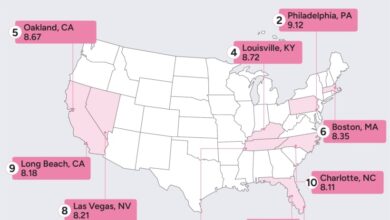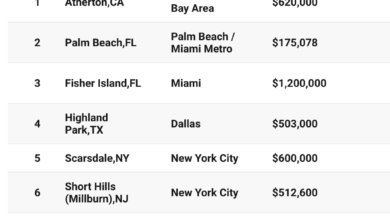Property Taxes in America’s Richest ZIP Codes: Which Cities Tax the Wealthy Most?

When it comes to wealth, location matters — not just for lifestyle, but for how much the government takes from your property.
In America’s richest ZIP codes, where luxury estates, gated communities, and multi-million-dollar mansions line the streets, property taxes are more than a financial footnote — they can run into the hundreds of thousands per year.
But not all wealthy homeowners are taxed equally. Depending on where you live, a $5 million home could cost you $20,000 a year in taxes — or closer to $100,000.
In this article, we break down the property tax burdens in America’s wealthiest ZIP codes, comparing the effective property tax rates and the average tax bill in each. The results may surprise you.
How Property Taxes Are Calculated
Property taxes are generally based on:
- Assessed value of the property (which may differ from market value)
- Local tax rate (mill rate or effective property tax rate)
Each city and county sets its own rate, meaning two identical homes could face wildly different tax bills just a few miles apart.
Key Findings: Who Pays the Most?
- Atherton, CA (94027): Despite being America’s wealthiest ZIP code with a median home value of $7.9M, California’s Prop 13 limits tax increases — keeping rates low at just 0.7%.
- Alpine, NJ (07620): New Jersey has one of the highest effective property tax rates (~2.2%), leading to annual bills over $100K on homes worth $5M+.
- Palm Beach, FL (33480): Florida’s lack of income tax makes it a wealthy magnet, and moderate property tax rates (0.72%) keep the total cost of ownership relatively efficient.
- Greenwich, CT (06830): With high home values and tax rates over 2%, property owners here pay some of the highest real estate tax bills in the Northeast.
- Sagaponack, NY (11962): Hamptons luxury combined with Long Island taxes results in tax bills that can exceed $125,000 per year on large estates.
Why It Matters: Tax Planning for the Rich
High-net-worth individuals often structure their real estate purchases with tax efficiency in mind. Some considerations include:
- Establishing primary residence in low-tax states
- Homestead exemptions and legal tax abatements
- Using LLCs or trusts for property holdings
Understanding how property taxes vary by ZIP code is crucial for anyone managing large real estate assets — especially when bills exceed $50,000–$100,000 per year.
Final Thoughts
While high income and capital gains taxes get a lot of attention, property taxes are one of the most overlooked — and least avoidable — ways local governments collect from the wealthy.
If you’re investing in luxury real estate or considering a move to a high-net-worth area, it pays to know the property tax landscape. As shown, the richest ZIP codes aren’t always the ones with the highest tax bills — and that’s often by design.




